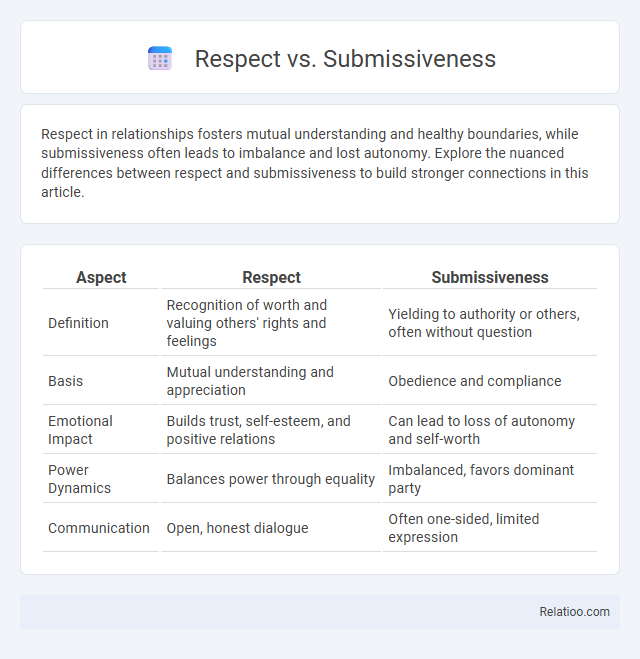Respect in relationships fosters mutual understanding and healthy boundaries, while submissiveness often leads to imbalance and lost autonomy. Explore the nuanced differences between respect and submissiveness to build stronger connections in this article.
Table of Comparison
| Aspect | Respect | Submissiveness |
|---|---|---|
| Definition | Recognition of worth and valuing others' rights and feelings | Yielding to authority or others, often without question |
| Basis | Mutual understanding and appreciation | Obedience and compliance |
| Emotional Impact | Builds trust, self-esteem, and positive relations | Can lead to loss of autonomy and self-worth |
| Power Dynamics | Balances power through equality | Imbalanced, favors dominant party |
| Communication | Open, honest dialogue | Often one-sided, limited expression |
Understanding the Concepts: Respect and Submissiveness
Respect involves recognizing and valuing others' rights, feelings, and opinions, fostering mutual understanding and equality in relationships. Submissiveness entails yielding to others' authority or will, often accompanied by a sense of compliance or obedience that may lack mutual respect. Distinguishing respect from submissiveness is essential for healthy interactions, as respect promotes dignity and autonomy, while submissiveness can imply power imbalance and loss of self-expression.
Defining Respect: Core Elements and Importance
Respect involves recognizing and valuing the inherent dignity, rights, and feelings of others, fostering mutual understanding and trust in relationships. Unlike submissiveness, which implies yielding or compliance under pressure, respect is a voluntary and active appreciation that promotes healthy boundaries and equality. Your ability to demonstrate respect strengthens social bonds and enables effective communication without compromising autonomy.
What is Submissiveness? Traits and Implications
Submissiveness refers to a behavioral tendency to yield to the authority or control of others, often characterized by compliance, passivity, and a reduced assertion of personal will. Traits of submissiveness include agreeableness, deference, avoidance of conflict, and a preference for following directives rather than leading. This behavioral pattern can impact personal relationships and social dynamics by fostering cooperation but may also lead to diminished self-esteem and vulnerability to exploitation if taken to extremes.
Key Differences Between Respect and Submissiveness
Respect involves recognizing and valuing another person's qualities or rights, fostering mutual understanding and equality in relationships. Submissiveness entails yielding to another's authority or control, often resulting in an imbalance of power and diminished autonomy. Key differences lie in respect promoting voluntary acknowledgment and mutual regard, whereas submissiveness implies passive acceptance or compliance without equal standing.
Psychological Impact of Respect vs Submissiveness
Respect fosters healthy psychological development by promoting self-worth and mutual understanding, whereas submissiveness often leads to feelings of powerlessness and diminished self-esteem. Your mental well-being benefits from environments where respect is prioritized, as it encourages autonomy and emotional resilience. Submissiveness, when excessive, can contribute to anxiety and dependence, impairing personal growth and interpersonal balance.
Cultural Perspectives on Respect and Submissiveness
Cultural perspectives on respect and submissiveness vary significantly, shaping social interactions and individual behavior in diverse societies. In many Eastern cultures, respect often intertwines with submissiveness, emphasizing hierarchical relationships and collective harmony, whereas Western cultures typically distinguish respect as mutual acknowledgment without mandatory submissiveness. Your understanding of these cultural nuances enhances cross-cultural communication and fosters meaningful, respectful interactions.
Respect and Submissiveness in Relationships
Respect in relationships fosters mutual understanding, trust, and equality, allowing both partners to feel valued and heard. Submissiveness involves yielding to another's authority or desires, which can enhance harmony if balanced but may lead to imbalance if overextended. You should prioritize respect to build a healthy, supportive connection where boundaries and individuality are honored.
Leadership: Fostering Respect, Avoiding Submissiveness
Effective leadership thrives on fostering genuine respect rather than encouraging submissiveness, as true respect empowers collaboration, innovation, and trust within teams. You can cultivate an environment where individuals feel valued and motivated to contribute authentically without fear of dominance or control. Prioritizing respect over submissiveness enhances both morale and productivity, driving sustainable organizational success.
Healthy Boundaries: Cultivating Respect without Submission
Healthy boundaries foster a dynamic where respect is mutual and empowers individuals without demanding submission. Cultivating respect involves clear communication, self-awareness, and recognizing personal limits to prevent unhealthy power imbalances. This approach ensures relationships are balanced, valuing autonomy while promoting genuine regard for each other's dignity.
Building Self-Esteem: Choosing Respect over Submissiveness
Building self-esteem involves embracing respect rather than submissiveness, as respect promotes self-worth and assertiveness, while submissiveness often leads to self-diminishment and loss of personal boundaries. Choosing respect cultivates a healthy self-image and empowers individuals to maintain dignity in interactions, fostering mutual understanding without sacrificing one's values. This distinction is crucial for developing confidence and emotional resilience in personal and professional relationships.

Infographic: Respect vs Submissiveness
 relatioo.com
relatioo.com